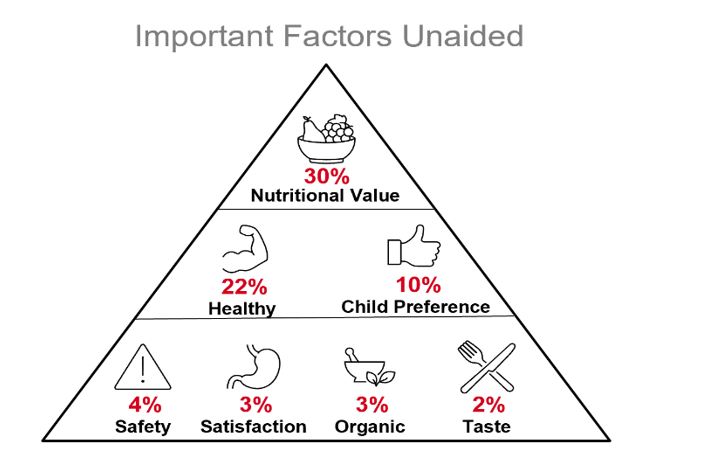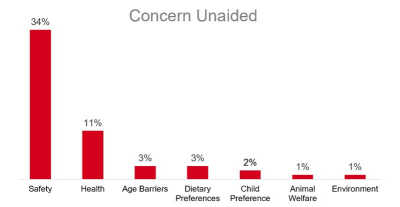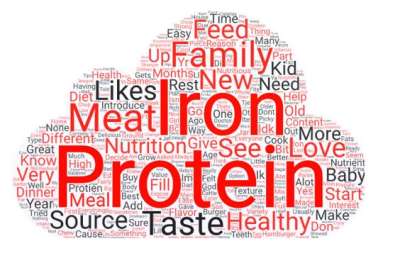Beef is an important complementary food for infants and toddlers during the first few years of life when rapid growth and development occur. Health authorities like the World Health Organization and the American Academy of Pediatrics recommend animal source foods, like beef, to ensure nutrient needs such as iron and zinc – are met. Proper nutrition is critical during this time, particularly since by 6 months of age iron stores are depleted and breastmilk alone can no longer meet all of the infant’s nutrient requirements. Given the important role beef has in a younger child’s diet, The National Cattlemen’s Beef Association, a contractor to the Beef Checkoff, launched a research project on parents’ feeding habits when their children are 6 to 24 months old. Specifically, the research looked to investigate parents’ perceptions, benefits, and barriers to feeding their child, 24 months or younger, beef.
The research was conducted in August 2020 using an online quantitative survey of 906 parents. Two groups were surveyed to give depth and perspective to the discussion. Group one consisted of 465 parents who currently had a child between six and twenty-four months old; while group two consisted of 441 parents with a child between the ages of two and five. In addition to the children’s age groups parents also had to have some influence on food decisions for their child and be a parent, legal guardian, caregiver, or grandparent. Within the survey, both parents who feed their child beef, and those who do not, were asked similar questions to reveal insights into the benefits and current barriers to feeding their children beef.

One of the major findings in the research was that nutritional value is the most important element when parents are deciding what food to feed their child. When asked, 30% of parents mentioned nutritional value as a top of mind importance factor. Additionally, 82% ranked nutritional value as an important factor when given a broader list of options. While safety did not come up unaidedly, it was ranked as a top importance factor along with nutritional value. Specific to nutritional value, protein, vitamins, and minerals were the top underlying benefits that parents are looking for when deciding what to feed their child.
Despite recommendations to introduce iron rich food sources, like beef, starting around 6 months of age, this research shows that beef introduction is most likely to occur after the age of 12 months, with only about 30% of parents introducing beef before the age of 1. Even though introduction is later than other solid foods, the benefits of feeding beef in the early years are realized by parents. Over half of parents who are feeding their children beef say the top benefit of beef is its nutritional value with 46% saying it supports healthy growth.


While parents understand the benefits of beef and the importance of it in the early years, the biggest barrier and concern is safety, specifically choking. Choking is the number one concern that parents who are not feeding their child beef have about introducing beef. Secondarily, concerns such as digesting or chewing were also concerns parents had related to safety. Introducing new and safe ways to prepare beef for children in the early years could increase their likelihood to introduce it and alleviate those safety concerns.
Regardless of age, the main reason parents decided to introduce beef to their children is the nutritional value. Specifically, 28% of parents mentioned they started feeding their child beef due to the nutritional value. As mentioned, nutritional value is a top importance factor and parents understand that is beef’s top benefit in the early years particularly when it comes to iron and protein. In addition to the nutritional benefits of beef, overall convenience and preference for beef were also drivers of introduction, with some parents mentioning they introduced it because it was what they were also eating.
“[I started feeding my child beef] to start supplying my son with the nutrients that would give him the necessary nutrients to be strong and healthy.”
“We eat beef fairly regularly in my household. I want her to eat what we're eating.”
“We eat beef fairly regularly in my household. I want her to eat what we're eating.”
– Direct consumer quotes
To support the introduction beef earlier in development, parents are looking for kid friendly recipes, particularly ones that highlight nutritional value. They also want recommendations from their pediatricians and other trusted sources to reassure them it is acceptable. While it is important to look for ways to encourage the early introduction of beef, alleviating safety concerns will be of utmost importance.